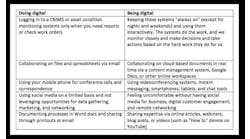While we frequently talk about the tools and technologies and strategies of digital transformation, but the evolution of leadership among those spearheading these changes is rarely explored. Let’s change that.
Here’s a Q&A with Wiktor Schmidt, CEO of Netguru, who prides himself on maintaining a nimble leadership style that matches this fluid period of industry. Take a look…
Smart Industry: Why will new leadership be needed to fully realize digital transformation?
Wiktor: Digital transformation is happening at a rapid pace. Now, more than ever, leadership teams will have to adapt in order to see their companies succeed and, in some industries, survive. What we need is “digital leadership.” It’s important for leadership teams to understand the kind of technologies and processes they'll need to adopt in order to keep up. Successful leaders will need to find new ways to adapt and lead, or companies will need to find executive leadership that's finely attuned to steering companies through new activities, processes and technologies needed to fully realize digital transformation internally.
Smart Industry: What kind of leaders are we talking about?
Wiktor: Digital leaders that will be best suited at steering their companies through digital transformation share a few traits: they're risk-taking, forward-thinking and agile. They know how to leverage digital tools and frameworks. They're not afraid to create environments within their organizations for experimentation. They're able to quickly implement processes and spot opportunities within their companies as working environments become more complex. They're also always honed in on the reason that their company is undergoing digital transformation—they've got their eye on why their company needs to stay innovative, and how they can remain competitive and productive.
Smart Industry: How have you organized Netguru for success in this digital world?
Wiktor: From the start, we built Netguru to be a global company, well-positioned to be adaptable and successful in the digital world. We planned—and continuously plan—for iterating our internal processes as the external world shifts and evolves. We structured the agency to be fully remote, with more than 500 employees and clients across 16 time zones. We’ve utilized technology and digital tools to communicate and quickly collaborate across time zones. We’ve kept a strong focus on digital processes at our core, and continuously experiment with processes, systems, and technologies internally and with our clients to be more efficient and productive.
We’ve been committed to digital transformation from the start—everyone from our leadership down to our project managers, designers and developers have “bought in” to the way we work and are open to changes to the business when needed.
Although our internal planning and systems have given us the ability to successfully scale in the last ten years to become one of Europe’s fastest-growing agencies, none of this would be possible without the strong company culture that we’ve been able to cultivate over the years. To be digital-transformation-friendly, it is extremely important to have a culture steeped in trust. This helps us work with teammates and clients across the world; the trust we have in each other allows us to work at our best remotely and it opens the door to many more opportunities that we wouldn't have otherwise
Smart Industry: You routinely alter your role as CEO. Why?
Wiktor: The informal motto inside of Netguru is “the only constant is change.” We constantly reinvent ourselves, and structure quarters to have “themes” or an area of focus that the whole company hones in on. The entire executive management team then strategizes on how the company can improve on the quarterly theme. For example, when the executive team observed that our staff was spending the majority of their time on client work, and less on other critical areas (such as R&D), they labeled a quarter “350 Strong” with the goal of increasing our headcount to 350. Another quarter it was “1% Improvement,” where the team focused on smaller items that needed priority, but were just as important, such as culture building.
As the management team continuously restructures their focus and priorities each quarter, so do I. One quarter I'll align with a focus and spend more time meeting clients face-to-face or recruiting, and the next quarter I'll emphasize the agency’s activities in thought-leadership. By taking the time to emphasize different aspects of my role to fit quarterly areas of focus, we're able to successfully steer Netguru’s activities as the company rapidly scales.
Smart Industry: What are key elements to successful leadership in the age of digital transformation?
Wiktor: I think there are three key traits of a successful digital leader:
- Always be open to new ideas. Digital transformation brings a lot of learning and adapting, and this will only continue. The way we work will constantly change due to the rise of technology, and there will always be a better, more efficient ways of operating. Don’t be the person who stifles innovation due to a closed mindset.
- Adopt and be open to new leadership opportunities. Long gone are the days of the C-suite conducting operations behind closed doors and leading by giving top-down orders. Executives need to show that they’re people too—and a good way to do that is adopt new leadership styles. This can be broad ideas, such as leading by example, or specific strategies like having employees provide quarterly feedback on your leadership style or changing the focus of your role bi-annually. Regardless of the specific method, it’s important to continuously find innovative ways to lead.
- Admit that you don't know everything. If you’re accustomed to “doing things the right way,” adapting as a leader in the age of digital transformation might become a tough task. A way to circumvent this is to be self-aware enough to admit when you don’t know the best approach. It’s okay to bring in help, whether it be a colleague to lead innovation within your company, or a coach who can help you learn best leadership practices for the longevity of your company.

